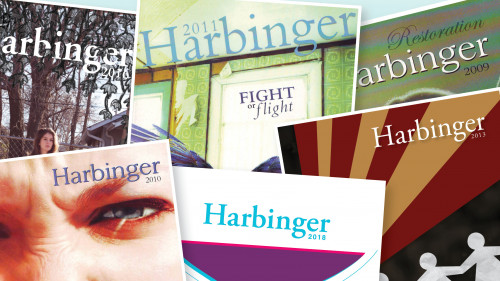Renée Reed-Miller '03 is the concept pioneer of an integrative, trauma-informed community engagement process called Thanks In Advance (TIA). She uses expressive arts to promote trauma-sensitive, healing-centered practices in families, organizations and communities. As founder of Reed-Miller Group, she collaborates with public and private entities to design trauma-informed policies and procedures critical to co-managing human and social services in varied contexts. Reed-Miller fosters agile people via training workshops and keynote addresses on various subjects; such as: socio-emotional health and mental well-being. Reed-Miller is also the founder of a small, local-to-global non-profit organization called Vessels International, with past projects in Haiti, India, Jordan, Missouri, Nepal and Uganda.
Kristine Somerville, Assistant Professor of English and Creative Writing: What year and issue of Harbinger did you edit? What did you like about it?
Renée Reed-Miller:
During one of those years, we had the privilege of working with Speer Morgan from The Missouri Review — and his feedback offered a boost to the editorial process. ETA chapter began to thrive again, from 2001-2003, due to skilled contributors, local and international service projects, a passionate team of students and advisors — and, most importantly, due to the direct success of Harbinger.
What did you learn from your experience as the editor of Harbinger?
As editor of Harbinger, I developed professional skills to last a lifetime and honed core values that guide me on daily basis, such as: mutual respect, active listening, inclusivity, humble inquiry, equity and agency. While serving in this capacity, I gained deeper empathy and appreciation for those who produce a themed literary publication. Although I initially had an acute eye for revision and an expectation of perfection, the work itself birthed in me a deeper understanding of the processes and challenges faced by reviewers in this arena. The feedback of editors carries added weight with me now, because I served in the role of a constructive critic nurturing other writers. I am grateful for the valuable lessons I gained, through this authentic and co-creative exercise at Stephens College.
What is your job now? What do you love about it? What are the challenges?
My work now focuses on frontline community-level intervention for collective healing and mental well-being. Growing the socio-emotional health of individuals, families, teams and communities is rewarding yet emotionally laborious work. Through the use of non-clinical, therapeutic and contemplative practices, including therapeutic creative writing, I am devoted to the growing the field of healing-centered arts in all of my occupational endeavors. I mentor artists, writers and community-builders.
The challenges of this work are manifold; central barriers include: 1) educating the general public on the merits of these practices in maintaining mental, physical and spiritual wellness; 2) recruiting and mentoring people of color to ensure we have adequate representation within historically-underserved communities; 3) contributing to transdisciplinary research on intergenerational trauma.
What advice would you give graduating English and Creative Writing majors?
Exercise compassion. Collaborate rather than compete. Remember that your skill-sets translate into just about any occupation. Stretch and grow —boldly. You are a versatile vessel capable of serving anywhere in the world. Your gifts will make room for you, in unexpected and exhilarating places, if you take care of yourself and love others enough to listen.
What's your favorite book, film, and song?
Really? It’s downright impossible to narrow these down. Eek.
Books:
- Portrait of a Turkish Family by Irfan Orga
- Jane Eyre by Charlotte Brontë
- Fuel by Naomi Shihab-Nye
Songs:
- “Celestine” (Peter Kater)
- “The River” (Garth Brooks)
- “Where the Streets Have No Name” (U2)
- “Three Little Birds” (Bob Marley and the Wailers)
Films:
- Kartini: Princess of Java
- Jodhaa Akbar
- Like Water for Chocolate
Please share an inspirational quote from one of your most admired people.
“Sunshine all the time makes a desert.” (Arabic proverb)
English and Creative Writing
English and Creative Writing Program Chair
